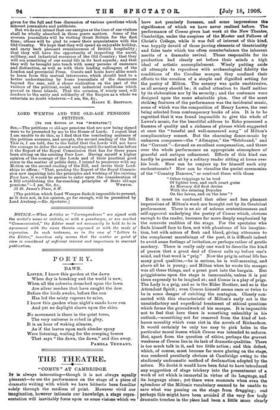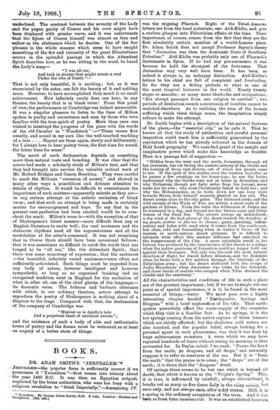THE THEATRE.
" COMUS " AT CAMBRIDGE.
IT is always interesting—though it is not always equally pleasant—to see the performance on the stage of a piece of dramatic writing with which we have hitherto been familiar solely through the medium of print. However vivid our imagination, however intimate our knowledge, a stage repro. sentation will inevitably force upon us some--visions which we have not precisely foreseen, and some impressions the significance of which we have never realised before. The performance of Caucus given last week at the New Theatre, Cambridge, under the auspices of the Master and Fellows of Christ's College, while it was full of interest of this 'kind, was happily devoid of those jarring elements of theatricality and false taste which too often counterbalance the inherent merits of a dramatic revival. Those responsible for its production had clearly set before their minds a high
ideal of artistic accomplishment. Wisely putting aside all attempts to reproduce with archaeological fidelity the conditions of the Caroline masque, they confined their
efforts to the creation of a simple and dignified setting for the poetry of Milton. The scenery was quite unobtrusive, as all scenery should be; it called attention to itself neither
by its elaboration nor by its severity; and the costumes were designed upon the same admirable plan. One of the most striking features of the performance was the incidental music, some of which was the composition of Henry Lawes, the rest being selected from contemporary books of airs. It is to be regretted that it was found impossible to give the whole of Lawes's music, for the beautiful address to Echo possessed a fineness of quality and a richness of phrase which suggested at once the "tuneful and well-measured song" of Milton's complimentary sonnet. But the charming dance-music by unknown composers—the "Allmayne," the "‘Selebrancl," and the " Corrant "—formed an excellent compensation, and threw over the whole performance an appropriate atmosphere of graceful and antique refinement. Effects of this kind can hardly be guessed at by a solitary reader sitting at home over his book. How can he conjure up for himself such airy enchantments? How can he visualise the quaint ceremonies of the "Country Dancers," or contrast them with those
"Other trippiugs to be trod
Of lighter toes, and such court guise As Mercury did first devise With the mincing Dryades On the lawns, and on the leas " P
But it must be confessed that other and less pleasant impressions of Milton's work are brought out by its theatrical performance. There is an air of solemn sententiousness and self-approval underlying the poetry of Corn us which, obvious enough to the reader, becomes far more deeply emphasised by
the concrete realities of the stage. For the spectator who finds himself face to face, not with phantoms of his imagina- tion, but with actors of flesh and blood, giving utterance to the complacent moralisings of the poet, it is difficult indeed to avoid some feelings of irritation, or perhaps rather of gentle mockery. There is really only one word to describe the kind
of person that a great deal of Comas calls up before one's mind, and that word is "prig." Now the prig in actual life has
many good qualities,—he is serious, he is well-meaning, and above all he is young ; and Milton when he wrote his masque
was all these things, and a great poet into the bargain. But priggishness upon the stage is inexcusable, unless it is put there expressly to be laughed at; and Comus is a play of prigs. The Lady is a prig, and so is the Elder Brother, and so is the Attendant Spirit ; even Comus himself seems once or twice to
be in some danger of catching the contagion. Closely con- nected with this characteristic of Milton's early art is the unsatisfactory and superficial treatment of ethical questions which forms the groundwork of his masque. It is impossible not to feel that here there is something unhealthy in his outlook,—something not far removed from the kind of hot- house morality which runs riot in the novels of Richardson.
It would certainly be only too easy to pick holes in the particular moral lesson which Comm was intended to enforce.
But, apart from the question of ethics, perhaps the gravest
weakness of Com= lies in its lack of dramatic qualities. There is too much talk in it, and too little action ; and this defect, which, of course, must become far more glaring on the stage, was rendered peculiarly obvious at Cambridge owing to the studiously undramatic method of declamation adopted by the actors. No doubt it would have been fatal to have introduced any suggestion of stage trickery into the presentment of a work of art which is immortal in virtue of its language, and its language alone ; yet there were moments when even the splendour of the Miltonic vocabulary seemed to be unable to save what was passing on the stage from dragging ; and perhaps this might have been avoided if the very few truly dramatic touches in the piece had been a little more clearly
*interlined. The contrast between the severity of the Lady zarnd the pagan gaiety of Comus and his crew might have
been displayed with greater verve, and it was unfortunate -"hat the figure of Comus himself was almost as lean and
allow as the abstinence which he decries. One of the few 'phrases in the whole masque which seem to have caught -something- of the fire and intensity of the great Elizabethans -occurs in the splendid passage in which the Attendant -Spirit describes how, as he was sitting in the wood, he heard
:the Lady's song—
"I was all ear, And took in strains that might create a soul
Under the ribs of Death."
'That "'That is not only beautiful, it is exciting ; but, as it was - enunciated by the actor, one felt the beauty of it and nothing more. However, to have accomplished thus much is no small . achievement. How infinitely rarely does one hear, in any theatre, the beauty that is in blank verse ! From this point • of view, the performance at Cambridge was indeed memorable.
It was a singular pleasure to listen to the lines of Milton spoken in purity and correctness and ease by those who were familiar with the true spirit of poetry. More than once one wished to interrupt the progress of the piece with the words - of the old Cavalier in " Woodstock " :—" These verses flow sweetly, and sound in my ears like the well-touched warbling --of a lute Repeat me them again, slowly and deliberately; for I always love to hear poetry twice, the first time for sound, -"the latter time for sense."
The merit of such declamation depends on something more than natural taste and breeding. It was clear that the actors had made a scholarly study of Milton's text, and that they had brought into service the valuable critical work of Mr. Robert Bridges and Canon Beeching. They were careful to mark the Miltonic "recession of accent," and showed in many other ways a punctilious and delicate attention to • details of rhythm. It would be difficult to overestimate the importance of such matters—apparently minute as they are-- in any serious attempt at the artistic recitation of blank - verse ; and that such an attempt is being made is certainly —matter for encouragement and hope. To say that in the -present case perfection had been reached would be to over- -shoot the mark. Milton's verse is—with the exception of that • of Shakespeare's latest manner—more difficult than any in English literature to recite well; the vast sentences and the elaborate rhythms need all the expressiveness and all the
modulation at the actor's command. It was not surprising - that in Comas there should have been occasional failures;
that it was sometimes so difficult to catch the words that one
-longed to be "all ear," like the Attendant Spirit; that - there was some monotony of expression ; that the sentences
—the beautiful, infinitely varied sentences—were often not sufficiently articulated. Such things must be expected from any body of actors, however intelligent and however sympathetic, so long as no organised training and no
- recognised tradition exist in England for the recitation of what is, after all, one of the chief glories of the language,—
its dramatic verse. The hideous and barbaric utterance with which, in our ordinary theatres, actors attempt to reproduce the poetry of Shakespeare is nothing short of a - disgrace to the stage. Compared with that, the declamation of the company at Cambridge was
"Musical as is Apollo's lute And a perpetual feast of nectared sweets";
and the existence of such a body of able and enthusiastic lovers of poetry and the drama must be welcomed as at least an augury of a better state of things.







































 Previous page
Previous page